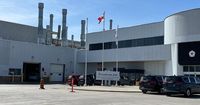Despite ongoing trade tensions and tariffs imposed by the U.S. government, American tourists continue to flock to Canada, particularly Ontario, where the tourism sector remains a significant contributor to the economy. Experts attribute this resilience to favorable exchange rates and the diverse offerings of Canadian destinations, but they caution that perceptions of welcome are crucial for maintaining this flow of visitors.
According to Andrew Siegwart, president and CEO of the Tourism Industry Association of Ontario, American tourists spent over $30 billion in Ontario last year, accounting for about 20 percent of total tourism revenue. "We have some concerns about the American market right now, a little bit of potential softness," Siegwart stated during an interview with CBC Radio's Metro Morning. He emphasized the importance of marketing efforts to ensure that Americans feel welcomed despite the political climate.
As tensions escalate between the two countries, with the U.S. imposing tariffs on various imports, including vehicles and parts, the tourism industry in Ontario is working hard to counteract any negative perceptions. Siegwart noted, "We are all 'elbows up' on policy right now, but tourism operators remain 'arms open' to our American visitors to ensure that they understand that they are welcome." He highlighted Ontario's appeal, stating, "The beauty of Ontario is that we have a little something for everyone. We're not a one-trick pony... We're known for our culinary scene, our dynamic urban experiences, our outdoor adventure. So really, the diversity is what we have to offer."
Currently, data from the Canada Border Services Agency indicates little change in the number of Americans crossing the border by air in March 2025 compared to the previous year. Tony Elenis, president and CEO of the Ontario Restaurant Hotel and Motel Association, noted that approximately 11 million visitors from the U.S. come to Canada annually. He believes that the weak Canadian dollar is a significant factor in attracting American tourists, stating, "The Americans will continue to be here because it's not about the Canadians or Americans. This is about one guy. That will not stop them from coming."
Wayne Smith, a professor and director at the Institute for Hospitality and Tourism Research at Toronto Metropolitan University, echoed this sentiment, explaining that the current exchange rate effectively offers Americans a discount of about a third on their travel expenses. "If you're paying $200 on a hotel room, that's really saving $60 a night. That's a pretty substantial savings for coming across the border and staying in Canada," Smith said.
On a different front, the uncertainty surrounding U.S. trade policy has led to significant job losses and operational disruptions for several Canadian companies. Since his election, former President Donald Trump has introduced sweeping tariffs on imported goods from Canada and Mexico, which has created a ripple effect across various industries.
Stellantis, a major automobile manufacturer, announced it would temporarily halt production at its Windsor, Ontario, plant for two weeks starting April 7, 2025, impacting approximately 3,200 employees. The company cited policy changes resulting from the newly imposed U.S. tariffs on imported vehicles and parts. A spokesperson for Stellantis confirmed that this pause would also affect several U.S. facilities that supply components to the affected Canadian operations, resulting in the layoff of 900 U.S. hourly employees.
In another instance, Prepac Manufacturing Ltd. in Delta, British Columbia, has laid off more than 170 workers as the company shifts its production to a facility in North Carolina. Unifor communications representative Ian Boyko reported that manufacturing processes in Delta ceased on March 14, 2025. Unifor National president Lana Payne criticized the decision, stating, "In this case, Prepac and its equity owners are using the tariffs as an excuse to redirect all their production to the U.S. It’s pure greed." Prepac, which was founded in Canada in 1979, was acquired by TorQuest Partners in 2019 and subsequently opened a plant in Whitsett, North Carolina, in 2021.
Eascan Automatic Inc., a Winnipeg-based robotics and industrial controls company, also felt the impact of the tariffs, laying off approximately one-third of its workforce in late February 2025. The company stated that many projects were put on hold due to the uncertainty created by the tariffs. Eascan expressed that clients are hesitant to make large investments and are struggling to predict cost fluctuations for production and exporting. They noted that the cost of aluminum is expected to rise by nearly 50 percent due to supplier increases and tariffs.
As these companies grapple with the fallout from U.S. trade policies, the tourism sector in Ontario remains hopeful that American visitors will continue to choose Canada as their destination. With the exchange rate favoring American tourists and a diverse range of attractions, experts stress the importance of creating a welcoming atmosphere for visitors. "It's really important for us to continue to welcome them," Siegwart concluded, underscoring the need for proactive marketing and outreach efforts to maintain the flow of American tourists into Ontario.





